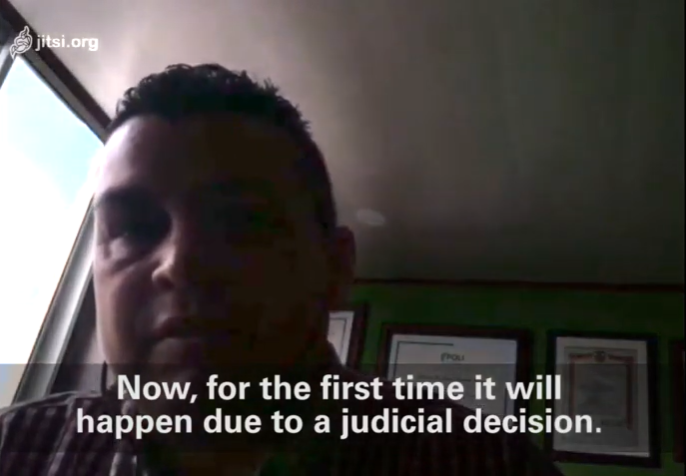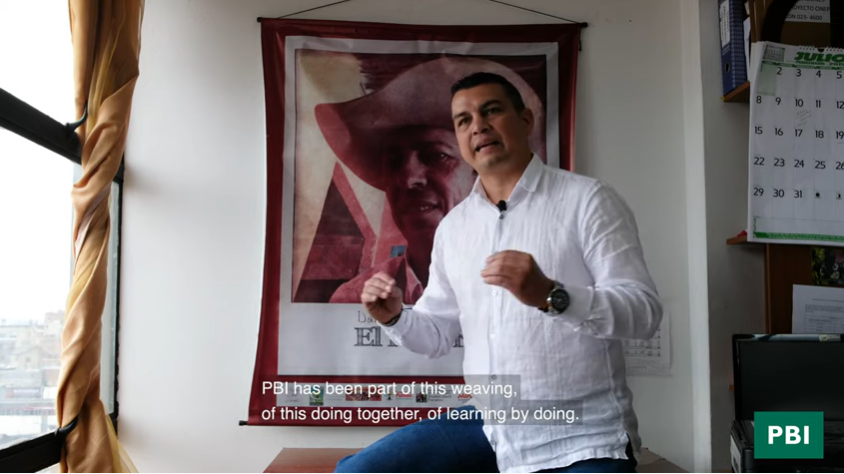Article by PBI-Canada

Peace Brigades International-Colombia Project article & video – Fabian Laverde: “We are right when we make denouncements.”
Fabian Laverde’s story as a human rights defender began in 1993 when he was still in high school, during a strike led by peasants who were drowning under predatory loans. They took to the streets to achieve better conditions and prices for their coffee.
Two years later, in another strike, he met an inspiring agrarian leader, Fernando Lambona. Lambona’s murder, just a few months later, taught Laverde about the risks involved in being a spokesperson for the forgotten people.
In 2004, Laverde had to leave his rural home after receiving death threats. His land had become a battlefield and the guerrilla presence was used against the peasants.
Paramilitaries sought to eradicate any possible social mobilization. Due to violence against the population, selective murders, enforced disappearances, and malicious prosecution, many people abandoned their lands.
Shortly after leaving his home for Bogotá, he learned of and joined the Social Corporation for Community Advisory and Training Services (COS-PACC), an organization that accompanies victims of grave human rights violations.
Laverde and the other members of COS-PACC have been detained, persecuted, surveilled, and threatened, among other kinds of persecution.
In the search to implement protection measures for defenders, on December 10, 2019, ten persecuted leaders, including Laverde filed a tutela (writ of protection of constitutional rights) with the motto “the right to defend rights.”
On March 25, 2020, the 45th Civil Circuit Court ruled in favor of the petitioners and recognized the fundamental right to defend human rights. The ruling was later confirmed by the Civil Chamber of the Superior Court of Bogotá.
Laverde applauds the court decision. After two decades of persecution, for the first time a court is obligating the Government to dialogue.
Laverde insists that the protection is not for him and the others who filed the tutela, but for organizational initiatives.
He says: “The ruling orders the National Government to implement collective protection measures that are decided upon with the social organizations.”
Laverde believes it is important to strengthen the indigenous, Cimarrona [maroon], and peasant guard initiatives [nonviolent unarmed Indigenous and Afro-Colombian collectives whose purpose is to protect their territories, ancestral cultures, and communities from all forms of violence].
“These are alternative options, that aren’t armed, but are based on grassroots power, from a community and peaceful perspective, with political territorial control.”
For Laverde, the National Protection Unit shouldn’t focus its efforts on providing protection with guns and bulletproof vests for at risk leaders and defenders, instead it should guarantee prevention measures, and recognize and support social processes.
At a time with shocking numbers on the murder of human rights defenders – 107 during 2019, according to the United Nations registry – Laverde celebrates this judicial victory that creates new opportunities for social movements.
To read the full Peace Brigades International-Colombia article, please click on “WE ARE RIGHT WHEN WE MAKE DENOUNCEMENTS,” FABIAN LAVERDE. To watch a 5-minute PBI-Colombia video interview with Fabian (with English subtitles), click here.
Additional video: “PBI has accompanied COS-PACC for more than ten years. Casanare has been an extremely victimized zone mostly because of the business that engages in the extraction of natural resources, especially petroleum.” – Fabián Laverde

